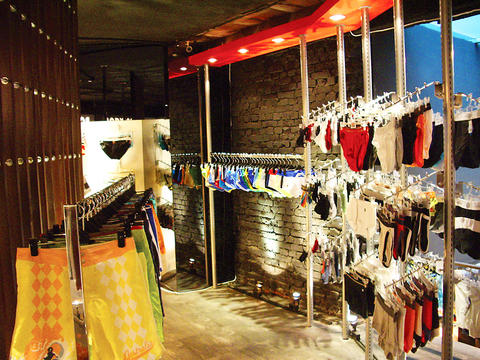Low waist, high slits, pure silk, wide belts: chic lingerie has never been so sexy. For men, that is.
Leano Lien (連宗旺) opened the boutique underwear chain Body Formula four years ago. His first shop was in Taipei's young, hip Ximending District (西門町), and has since expanded into the more mainstream East District (東區).
The simplest designs, starting at NT$700, provide a tailored cut that gives lift to the buttocks and definition in front. More creative options are as sheer as anything in the women's department and are accessorized with pendant medals and leather pouches. At the most basic level, the form-flattering skivvies are meant to be comfortable and hygienic. They're also meant to be seen.

PHOTO: COURTESY OF BODY FORMULA
And while Body Formula's underwear is intended to be sexy, Lien was eager to specify sexy-classy, not sexy-porn. Body Formula takes care to distinguish itself from sex stores.
"Many of our Japanese suppliers are meticulous in ensuring that their products are not degraded by being sold in sex shops," Lien said. With prices going up well into the thousands, these are clothing items aimed at giving pleasure to the wearer, and are anything but a party gimmick.
"The emphasis is very much on good cut and high quality materials," Lien said. "It overturns the conventional idea that underpants are not intended to be seen. Now they are as much a fashion statement as any other item of our clothing. They are an item of clothing that we must change regularly, so there is no reason why they shouldn't also be interesting from a fashion perspective."
Lien primarily imports Japanese labels such as Dugas, pointing out that these are more suitable for an Asian figure. "Asians can't always fill out the fuller cut in the buttocks of some of the US labels," Lien said, "and if they're baggy and ill-fitting, they really don't look good."
Lien started his business after returning from studying in Japan. "My friends would often ask me to bring back pants from Japan because they were not available in Taiwan." Now, such fashionable underwear has already made it into some of the hipper local department stores, and Lien is looking for new labels to add to his already wide section.

In the March 9 edition of the Taipei Times a piece by Ninon Godefroy ran with the headine “The quiet, gentle rhythm of Taiwan.” It started with the line “Taiwan is a small, humble place. There is no Eiffel Tower, no pyramids — no singular attraction that draws the world’s attention.” I laughed out loud at that. This was out of no disrespect for the author or the piece, which made some interesting analogies and good points about how both Din Tai Fung’s and Taiwan Semiconductor Manufacturing Co’s (TSMC, 台積電) meticulous attention to detail and quality are not quite up to

April 28 to May 4 During the Japanese colonial era, a city’s “first” high school typically served Japanese students, while Taiwanese attended the “second” high school. Only in Taichung was this reversed. That’s because when Taichung First High School opened its doors on May 1, 1915 to serve Taiwanese students who were previously barred from secondary education, it was the only high school in town. Former principal Hideo Azukisawa threatened to quit when the government in 1922 attempted to transfer the “first” designation to a new local high school for Japanese students, leading to this unusual situation. Prior to the Taichung First

Chinese Nationalist Party (KMT) Chairman Eric Chu (朱立倫) hatched a bold plan to charge forward and seize the initiative when he held a protest in front of the Taipei City Prosecutors’ Office. Though risky, because illegal, its success would help tackle at least six problems facing both himself and the KMT. What he did not see coming was Taipei Mayor Chiang Wan-an (將萬安) tripping him up out of the gate. In spite of Chu being the most consequential and successful KMT chairman since the early 2010s — arguably saving the party from financial ruin and restoring its electoral viability —

The Ministry of Education last month proposed a nationwide ban on mobile devices in schools, aiming to curb concerns over student phone addiction. Under the revised regulation, which will take effect in August, teachers and schools will be required to collect mobile devices — including phones, laptops and wearables devices — for safekeeping during school hours, unless they are being used for educational purposes. For Chang Fong-ching (張鳳琴), the ban will have a positive impact. “It’s a good move,” says the professor in the department of